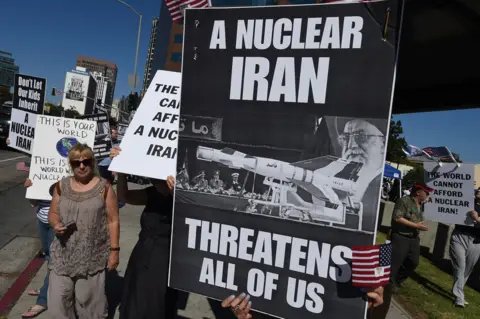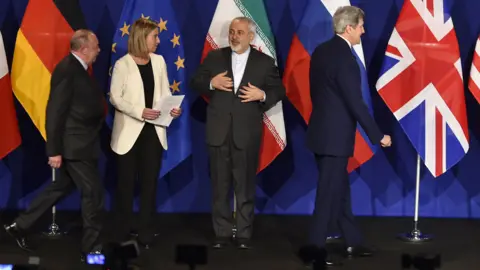Iran nuclear deal: Trump's high-stakes balancing act
 Getty Images
Getty ImagesPresident Donald Trump has extended sanctions relief for Iran one last time, says the White House. What does it mean?
The announcement puts a question mark over the future of the nuclear accord signed by Iran and six world powers in 2015.
The pact lifted economic sanctions in exchange for Tehran limiting its nuclear ambitions.
President Donald Trump was fiercely critical of the deal during his election campaign, and refused to certify it in October.
European powers have repeatedly urged the US not to abandon the agreement.
So why are they worried?
What are the waivers?
For years, economic sanctions were imposed by the US on Iran to try to curb its nuclear programme.
These measures cut Iran off from the global financial system.
Under the nuclear deal, known as the JCPOA, the US agreed to lift the sanctions by issuing executive waivers.
The White House has to verify to lawmakers that Iran is still in compliance with the terms of the agreement in order to keep the nuclear deal afloat.
To do this, it has been withholding the re-imposition of these sanctions.
This comes through an executive waiver issued by the president.
US law pertaining to the Iran nuclear deal, passed during the Obama administration, requires the White House to acknowledge Iran's compliance with the deal every 90 days.
It was a way for Republicans - who were opposed to the deal - to keep a check on President Obama and US participation in the accord.
These compliance conditions have rankled with Republican President Donald Trump, who campaigned against the deal.
Mr Trump has just extended the sanctions relief, but a senior administration official said "this is the last such waiver he will issue".
The White House wants European powers to impose permanent restrictions - currently set to expire in 2025 - on Iran's uranium enrichment. Mr Trump also wants Iran's ballistic missile programme addressed.
What is recertification?
Recertification of the nuclear deal is a two-part process.
Verifying that Iran is in compliance with the nuclear deal is part of it.
However, the second part involves the White House certifying that the nuclear deal remains in the US national security interest.
The original agreement was forged between Iran and the five permanent members of the UN Security Council, plus Germany.
On the campaign trail in 2016, candidate Trump repeatedly pledged to tear up the Iran deal if elected.
But since taking office, he has kept the accord alive by issuing the sanctions waivers. He has not, however, said the deal is in the US national interest.
In October 2017, Donald Trump decertified part of the deal on these national security grounds. This did not amount to quitting the accord.
The president kicked the fate of the agreement to Congress, demanding that lawmakers "address the deal's many flaws" by legislating tougher terms.
Congress had 60 days to do this, a time Mr Trump called the "snapback window". That deadline has passed.
 AFP
AFPWhat's the role of Congress in all this?
The Republican-controlled House would easily walk away from the JCPOA. But the ratio of Democrats to Republicans in the Senate makes this not so easy: Republicans have a narrow majority - 51 to 49.
If Trump again does not re-certify the deal then that reopens the so-called snapback window and again Congress would be in charge of coming up with negotiated terms for a revised deal. If they cannot reach an agreement, Congress could end the US role in the JCPOA.
In the House, a majority is required and in the Senate, Leader Mitch McConnell could introduce expedited legislation, bypassing the committee process - and go straight to the floor for a vote. Fifty-one votes are required to pass the Senate.
Mr Trump often touts his deal-making skills and this tactic appeared designed to see if some kind of bargain could be reached to fix what he did not like about the deal.
The original snapback window passed in December unnoticed.
A Senate aide tells the BBC: "Trump asked them not to do anything in the snapback window and instead said get me a better deal."
Senior members of the Senate Foreign Relations Committee - Republicans Bob Corker and Tom Cotton, as well as Democrat Ben Cardin - have been involved in coming up with new legislative text.
Why does Trump dislike the deal?
Mr Trump's repeated excoriation of the JCPOA as the "worst deal ever" while electioneering sought to depict the Obama administration as weak.
When he refused in October to continue to recertify the deal, the president condemned Iran as a "fanatical regime".
In a combative speech, he accused Iran of sponsoring terrorism and proposed new sanctions.
He said Iran had already violated the 2015 deal, which imposed curbs on Iran's nuclear capability in return for easing international embargoes.
But UN inspectors have certified nine times that Iran is in compliance with the deal.
Mr Trump's balancing act - decertify but keep the US within the accord for now - allows him to talk tough while staving off the messy consequences if it collapsed altogether.
What's the impact of the Iran protests?
The anti-government protests that erupted across Iran in December have added a layer of complexity to an already thorny issue.
Opponents of the Iranian regime are also critical of the deal because they say it does not punish the Islamic Republic for human rights abuses and involvement in conflicts such as Yemen and Syria.
With thousands arrested and imprisoned, and reports of deaths, suicide and torture, all eyes are on what Donald Trump's next move will be.
Iranian exiles have seized on the unrest to try to lobby American lawmakers to support a tough line on the regime.
Reza Pahlavi, the son of Iran's last monarch, was on Capitol Hill on Thursday meeting with hawkish Republican lawmakers, such as Adam Kinzinger and Ted Cruz.
Mr Pahlavi urged the sanctioning of Iranian officials and organisations for purported human rights abuses, as well as support for keeping Iran's telecommunications channels open.
What next?
The waiver suspends sanctions on Iran for 120 days.
Meanwhile, Treasury Secretary Steven Mnuchin said his department is weighing further sanctions in light of the protests.
The US still maintains separate sanctions on Iran related to matters such as terrorism, human rights and ballistic missile development.
A National Security Council spokesperson told the BBC: "The US government will hold accountable individuals and entities involved in the violent suppression of peaceful protests.
"We are examining what mechanisms we could utilize including targeted sanctions and other means."
